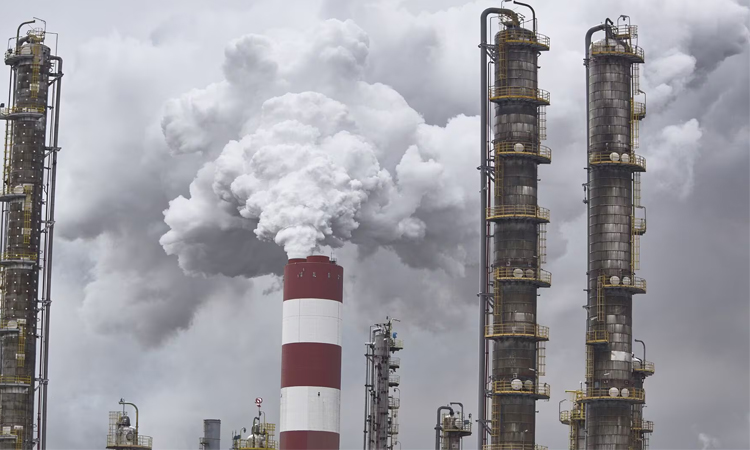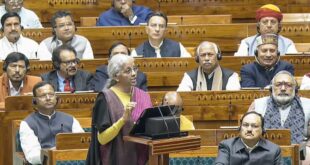
Dr. Seema Javed
Fossil fuels are not just driving climate change – they are creating a global health crisis that begins before birth and extends across the entire human life course. From extraction and transport to processing, burning, and waste, every stage of the fossil fuel life cycle harms health, often in ways that remain invisible in traditional data systems.

A sweeping new report-“Cradle to Grave: The Health Toll of Fossil Fuels and the Imperative for a Just Transition” released today by Global Climate and Health Alliance( GCHA), reveals the devastating impacts of fossil fuel on human health. It provides the first comprehensive global overview of the health consequences associated with fossil fuel use at every stage of their lifecycle, from extraction to waste, and across the human lifespan, from pregnancy and pre-birth to old age.
Most discussions about fossil fuels stop at the moment of combustion. Cradle to Grave takes a ground-breaking approach – mapping the entire fossil fuel lifecycle and exposing the health harms at every stage, from extraction to abandoned sites.
Key Findings-
Fossil fuel-related pollution affects every stage of life, from fetal development to old age. Exposure has been linked to increased risk of low birth weight, childhood cancer, asthma, neurological disorders, cardiovascular disease, and premature death. For instance, during the prenatal period, when vital organs are forming, exposure to pollutants from coal, oil, and gas extraction and combustion is linked to low birth weight, preterm birth, miscarriage, and a range of congenital abnormalities.
Many of these health harms are permanent, impairing the child throughout their lifetime. Children are also particularly vulnerable due to their faster breathing rates, narrower airways, and developing organs. Fossil fuel pollutants are linked to a wide range of health harms across multiple body systems. They impair lung function and exacerbate asthma and other respiratory diseases; increase the risk of cardiovascular disease and hospitalizations; disrupt cognitive function and mental health through impacts on the brain and nervous system; elevate the risk of cancers such as leukemia; cause reproductive damage; and contribute to premature mortality. Older adults face unique vulnerabilities due to declining organ function, pre-existing chronic diseases, and cumulative exposure.
At every stage of their lifecycle, fossil fuels cause severe health harms. Each phase – extraction, refining, transport, storage, combustion, and disposal – introduces harmful pollutants into the environment, many of which are long-lasting and bioaccumulative.
Extraction (e.g., fracking, coal mining, offshore drilling) releases benzene, heavy metals, radioactive materials, and particulates, driving up rates of respiratory disease, cardiovascular illness, cancers, adverse birth outcomes, and neurological disorders in surrounding populations. Refining and processing have been shown to emit carcinogenic chemicals such as benzene, toluene, and Volatile Organic Compounds (VOCs), posing serious risks to workers and nearby residents, especially in densely clustered industrial zones.
Transport and storage involve risks of chemical leaks and spills, which contaminate air and water and trigger acute and chronic health effects, including respiratory and neurological damage. Combustion, whether in power plants, vehicles, or homes, generates particulate matter 2.5 (PM2.5), nitrogen oxides, and other pollutants, significantly increasing risks of asthma, heart disease, stroke, cancer, dementia, and premature mortality.
Post-combustion waste (e.g., coal ash, gas flaring) continues to expose communities to heavy metals and toxins, contributing to long-term environmental degradation and chronic disease. Legacy pollution from abandoned fossil fuel sites causes sustained harm decades later. Fossil fuels are the largest source of greenhouse gas emissions, driving the climate crisis that fuels extreme weather, spreads disease, and causes lasting and devastating harm to human health. Many health harms remain dangerously understudied—often unfolding over decades, by which time the damage is irreversible
From the first extraction to the final emission- fossil fuels are the silent architects of suffering, claiming lives and undermining the quality of countless others. Air polluted by coal plants fills the lungs of our children. Rising temperatures caused by greenhouse gases push vulnerable populations to the brink of survival. Entire communities are displaced, their livelihoods destroyed, as fossil fuel extraction devastates ecosystems. These impacts are not abstract. They are felt in the lives of families, in the hospitals overwhelmed by preventable illnesses, and in the cries for climate justice that echo from every corner of the globe. This report goes beyond documenting the toll of fossil fuels—it is a powerful call to action. It challenges each of us (and our governments) to take responsibility, as stewards of health, policy, and justice, to accelerate the transition toward a sustainable future.
The cost of inaction is rising by the day. In 2022, global fossil fuel subsidies reached an estimated US$7 trillion, according to the IMF, including explicit subsidies such as tax breaks and price caps (US$1.3 trillion) and implicit subsidies of US$5.7 trillion. The latter are due to the unpriced societal costs of fossil fuel use including air pollution, climate change, traffic congestion and other health and environmental damages.
Phasing out fossil fuel subsidies and investing in clean, renewable energy could prevent millions of premature deaths, unlock over US$4 trillion in public revenue currently lost to unpriced pollution and climate impacts, and deliver long-term economic and health benefits. A rapid and just transition away from fossil fuels—and to clean, renewable energy—is imperative for health.
A just transition not only implies shifting toward renewable, clean and healthy energy sources but ensuring equitable access to these resources, particularly for historically marginalized and disproportionately impacted communities. It necessitates robust social policies, substantial investment in public healthcare, comprehensive environmental remediation, community involvement in decision-making, and fair economic opportunities for transitioning workers. Only through integrated approaches can we address the root causes of climate injustice, improve overall community resilience, and secure long-term health benefits for all populations.
Key Recommendations:Ending new fossil fuel exploration and development is essential for meeting global climate targets, particularly the 1.5°C threshold set by the Paris Agreement. Despite mounting scientific evidence and economic concerns, including over stranded assets, new projects continue to receive approval.
 Jubilee Post News & Views
Jubilee Post News & Views





